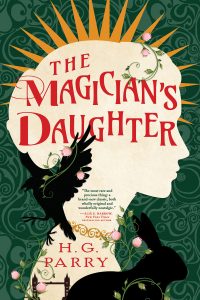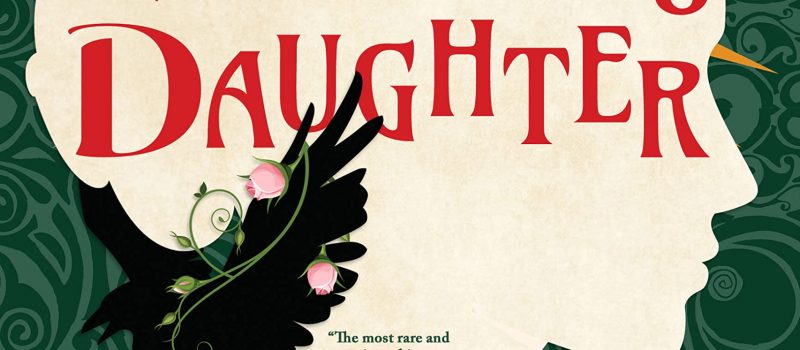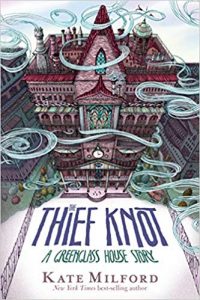Liz Bourke Reviews The Magician’s Daughter by H.G. Parry
 The Magician’s Daughter, H.G. Parry (Redhook 978-0-31638-370-7, $18.99, tp) February 2023.
The Magician’s Daughter, H.G. Parry (Redhook 978-0-31638-370-7, $18.99, tp) February 2023.
H.G. Parry’s The Magician’s Daughter is a very different novel to Rubicon. As with Rubicon, this is the first novel by the author that I’ve read. As with Rubicon, I’m favourably impressed. That’s about where the similarities end, because The Magician’s Daughter is a fantasy set in 1912, one I almost dismissed out of hand. It opens on the island of Hy-Brasil, from the point of view of a young woman called Biddy, and I’m practically allergic to the faintest hint of Celtic Romanticism in my fiction these days. (Blame overexposure to the devotees of W.B. Yeats. Romantic Ireland’s dead and gone/It’s with O’Leary in the grave.) But it would’ve been a mistake to dismiss it, for Parry uses folkloric elements not to wallow in the overblown sentimentality that clings to so much modern use of Irish and Scottish legendaria, but instead as part of a thematic interest in power and marginalisation.
I wish that interest had extended a bit further into the history part of historical fantasy, for if it had, The Magician’s Daughter might not have left me so disappointed in the gaps in its vision.
Biddy has lived nearly all the (not quite) seventeen years of her life on Hy-Brasil, an island rich in lingering magic, accessible to outsiders only once every seven years. The only other people in her life are her guardian, Rowan O’Connell, and his rabbit-shaped familiar spirit, Hutchincroft. Rowan and Hutch love Biddy, that much she knows, but her information about the world beyond Hy-Brasil comes mostly from books and a little from things that Rowan and Hutch tell her. She trusts that they’re keeping her safe. But Rowan’s not so good at keeping himself safe: at night he takes the form of a raven and goes off about secretive business, and lately he’s been returning rather bruised and battered. When one night he fails to return by his usual hour, Biddy has to use a magical artefact to enter his dreams and help rescue him from a trap. As a consequence, she learns that Rowan has been just… not mentioning some rather important facts.
Such as the existence of a Magicians’ Council in England, controlling magic and magicians in the territories of the British Empire. Such as that 70 years ago, magic began fading from the world, and the British Council reacted by hoarding magic for their own use – to the extent of insisting that magicians sacrifice their familiars and turn that magic over to the council. The Council became punitive and authoritarian even by the standards of the time. Rowan, the first Irish mage ever appointed to the Council, fled rather than sacrifice Hutch, and has opposed them in minor ways ever since. Which brings us to Biddy. Biddy has a mysterious fragment of magic embedded in her heart, and has for as long as Rowan’s known her. Anywhere but hidden Hy-Brasil, it would draw magicians to her, and the Council might try to extract it without much care for the harm it would do her.
Lately Rowan has been pursued more stringently, almost to Hy-Brasil itself, and he’s had no success in discovering the purpose of the magic in Biddy’s heart, or removing it so that she can live safely elsewhere. So Biddy volunteers to help him draw out one of the Council magicians. Being bait in a trap in one of the most depressing places in London leads Biddy to question her trust in Rowan – and that’s before the Council imprisons her, and she learns that there are secrets Rowan’s been keeping even from himself.
There are two reviews to write of this novel. One is the review I could have written had The Magician’s Daughter been wholly a fantasy novel and not rooted itself in reality. The other is the review that takes its historical rootedness seriously. The first review could praise this novel with a whole heart and admire its skill and technical accomplishment (it made me cry, for good reasons, and it earned those tears). The second, however, must take notice of a gaping absence.
Namely that The Magician’s Daughter sets itself in 1912 with an Irish magician character in conflict with a British magical authority, and yet it mentions nothing about Home Rule. Rowan may be ostensibly Irish, with Irish as his first language, yet though he’s raised Biddy from infancy in near-isolation, he’s taught her no Irish at all, nor yet apparently much about the history of Ireland. As a magician who’s been alive since at least the middle of the 19th century, he’s lived through a century and more of incredible political ferment on the Irish Question, in which language and religion both played striking roles, a ferment finding fresh expression in 1912’s Home Rule Bill (known as the Third Home Rule Bill). But neither language nor religion are mentioned in The Magician’s Daughter in anything but passing, and the politics of Anglo-Irish relations aren’t mentioned at all. That gap stands out to me like a missing tooth.
This is a gorgeously atmospheric coming-of-age novel that’s interested in power and marginalisation and the hoarding of resources. Yet there’s a gaping hole where relating the novel’s thematic concerns with power and marginalisation – hoarding magic, the compromises of advocating for change from inside the system when one has traditionally been excluded from the system, the resistance of systems of power to change when they feel under threat (in this case by the fading of magic from the world) – to actual historic events could have been. The conclusion of the novel restores magic to the world and overturns the power of the bad actor, Vaughan Carlisle, at the head of the British Magicians’ Council, theoretically opening the system to reform. But that ending essentially ducks the entire burning question of the legitimacy of power in favour of a feel-good restoration of the status quo ante. When the legitimacy of (British, colonial) power is a live coal of a question in 1912, particularly with reference to its Irish subjects, this seems like a yawning oversight.
The personal character arcs made me cry. The atmosphere is rich, detailed, full of sense and feeling. Narratively this novel works, and works well.
Or it would, if I hadn’t had three hours’ worth of lessons a week for three years on Irish history from 1869, in my impressionable youth.
The Magician’s Daughter is a triumph of skill and technique. It gets sense of place brilliantly. It interleaves the numinous and the quotidian delightfully. Its imagery is really striking. Biddy is a compelling character, sheltered but not naive. Her story is a journey of discovery, a coming-of-age into a wider world that leaps off the page in vivid, heart-rending detail. The novel’s treatment of a parent-child relationship and the child’s discovery that parents can be terribly flawed and fail and yet both still love you and be worthy of love is replete with generosity and emotional truth.
But it misses – or worse, dismisses as not interesting – part of the historical context that might well have fundamentally influenced its thematic treatment of power and marginalisation: a theme that, fully as much as the relationship between parent and child, defines The Magician’s Daughter’s shape and weight, its lasting, thought-provoking heft.
This is a novel worth reading, and yet, had it only reached a little further, it might have made itself something truly great.
Liz Bourke is a cranky queer person who reads books. She holds a Ph.D in Classics from Trinity College, Dublin. Her first book, Sleeping With Monsters, a collection of reviews and criticism, is out now from Aqueduct Press. Find her at her blog, her Patreon, or Twitter. She supports the work of the Irish Refugee Council and the Abortion Rights Campaign.
This review and more like it in the April 2023 issue of Locus.
 While you are here, please take a moment to support Locus with a one-time or recurring donation. We rely on reader donations to keep the magazine and site going, and would like to keep the site paywall free, but WE NEED YOUR FINANCIAL SUPPORT to continue quality coverage of the science fiction and fantasy field.
While you are here, please take a moment to support Locus with a one-time or recurring donation. We rely on reader donations to keep the magazine and site going, and would like to keep the site paywall free, but WE NEED YOUR FINANCIAL SUPPORT to continue quality coverage of the science fiction and fantasy field.
©Locus Magazine. Copyrighted material may not be republished without permission of LSFF.







